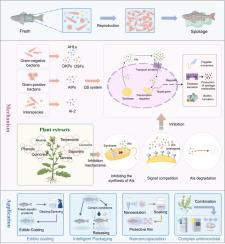Quorum sensing inhibitory of plant extracts on specific spoilage organisms and the potential utilization on the preservation of aquatic products
IF 13.3
1区 工程技术
Q1 ENGINEERING, CHEMICAL
引用次数: 0
Abstract
Microbiological contamination remains a significant challenge on the spoilage of aquatic products. The rapid proliferation of specific spoilage organisms (SSOs) in aquatic products can lead to the generation of harmful substances, thereby degrading the quality of these products. This underscores an urgent demand for innovative strategies to overcome this challenge. Quorum sensing inhibitors (QSIs) emerge as a promising approach in that they can mitigate microbial contamination by disrupting bacterial communication mechanisms, especially in strains prevalent in aquatic products. The signaling molecules involved in quorum sensing (QS) in aquatic products play a critical role in regulating bacterial population behavior. Inhibiting the QS system of bacteria offers an innovative strategy for bacterial control, which does not rely on the direct killing of bacteria but rather on the attenuation of their spoilage effects in aquatic products by disrupting their collective behavior. Plant extracts employed as QSIs have demonstrated the potential to effectively prolong the shelf life of food products owing to their natural, environmentally friendly, and potentially antimicrobial properties, thus rendering them a promising solution for the preservation of aquatic products. This comprehensive review provides an in-depth analysis of common signaling molecules and QS systems in SSOs of aquatic products. Besides, it evaluates the potential of plant extracts as QSIs to prolong the shelf life of aquatic products by inhibiting their QS mechanisms. Additionally, this review also highlights the potential application of plant-derived QSIs in the preservation of aquatic products.


求助全文
约1分钟内获得全文
求助全文
来源期刊

Chemical Engineering Journal
工程技术-工程:化工
CiteScore
21.70
自引率
9.30%
发文量
6781
审稿时长
2.4 months
期刊介绍:
The Chemical Engineering Journal is an international research journal that invites contributions of original and novel fundamental research. It aims to provide an international platform for presenting original fundamental research, interpretative reviews, and discussions on new developments in chemical engineering. The journal welcomes papers that describe novel theory and its practical application, as well as those that demonstrate the transfer of techniques from other disciplines. It also welcomes reports on carefully conducted experimental work that is soundly interpreted. The main focus of the journal is on original and rigorous research results that have broad significance. The Catalysis section within the Chemical Engineering Journal focuses specifically on Experimental and Theoretical studies in the fields of heterogeneous catalysis, molecular catalysis, and biocatalysis. These studies have industrial impact on various sectors such as chemicals, energy, materials, foods, healthcare, and environmental protection.
 求助内容:
求助内容: 应助结果提醒方式:
应助结果提醒方式:


